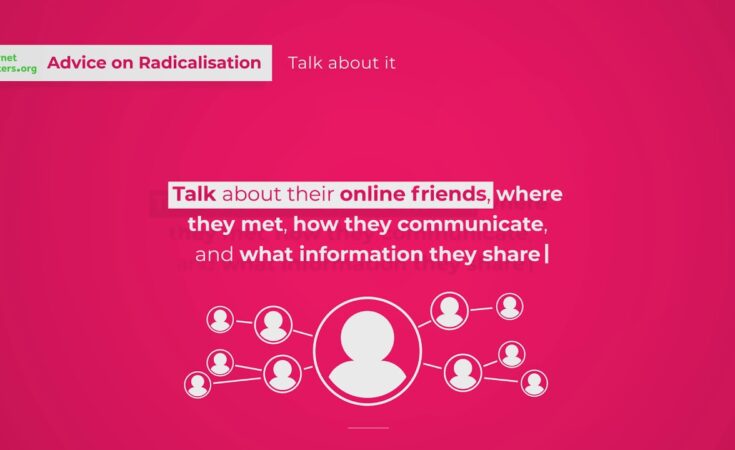Advice on how to help protect children from being radicalised online and how to help them challenge extremism content online. For more advice and guidance, visit: https://www.internetmatters.org/issues/radicalisation/
Transcript:
The online world gives children the opportunity to be exposed to a number of perspectives, some of which are considered as extremist.
As children engage with others online there is the chance that they may meet people who encouraged them to move from supporting moderate mainstream views to extreme ideological ideas that will affect their behaviour – This is the process by which they can become radicalised.
Often young people are targeted by extremist groups through social networks and enticed to continue conversations on networks that make it easier for them to hide their real identity.
Extremists groups take advantage of young people insecurities and often claim to offer answers and a sense of identity that vulnerable young people may be seeking out.
People who encourage young people are not always strangers; they may have met through family or a social gathering. The internet is then a means for further conversations away from others.
Often children don’t realise that their beliefs have been shaped by others, and think that the person is their friend with their best interests at heart.
Here are a number of signs to be aware of that may show that a child has been radicalised:
– A conviction that their religion is under threat
– Displaying intolerant views to people of other races, religions or political beliefs
– The need for identity and belonging
– Being secretive about who they are talking to online
– Possessing electronic devices that you have not given them
– Becoming emotionally volatile
Radicalisation can be difficult topic to discuss but there are things you can do to prepare young people on how to deal with it and help prevent them being unintentionally exposed to radical ideas.
Create a safe space for them to talk and let them know you’re there to help them if they get into trouble online. The more they can talk, the more you’ll be able to help them make smart choices online
Your child is far more likely to be open and honest with you if you remain calm about the situation.
Talk about their online friends, where they met, how they communicate, and what information they share. Remind them that people they meet may not be who they say they are, and may have ulterior motives for befriending them.
It’s important to debate ideas with your child to help them become more critical about their beliefs without shutting down their point of view.
Highlight the realities and consequences of radical ideas and the effect they can have on them and others
If you believe a child is in immediate danger, a threat to others or there is a risk they may leave the country, contact the police who will discuss your concerns and work with you to offer ways to protect the child
You can report any concerns about online grooming to the National Crime Agency’s CEOP Command
If your child is not in immediate danger, there are also a number of organisations that can help with one to one advice and support for you and your children. You can also call 101 to talk to someone.
View Original Video Here


































